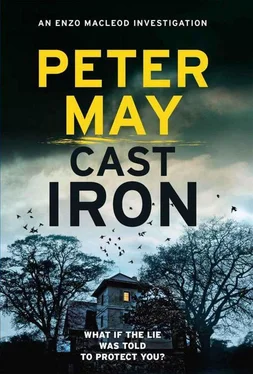‘Who pays for it, then?’
Anne-Laure shrugged. Sulking now, surly-faced. ‘I don’t know.’
‘How can you not know? It must be costing a fortune.’
‘I’m sure it is.’ She was wrestling with some inner resistance that was telling her not to say any more. But she knew there was no point in hiding it now. ‘About a week after Régis was sent down, the head of the clinic in Gradignan came to see me and Alice. He was a nice man. So good with Alice, too. He said they could offer her specialised care, but that she would have to live in.’ She sighed. ‘It wasn’t funny, but I laughed. I told him there was no way on this earth that I could afford to pay for that. And he said that I didn’t have to. That it was all taken care of.’
‘Who by?’
‘I don’t know.’
Dominique didn’t believe her. ‘You never asked?’
And a little of Anne-Laure’s earlier defiance returned. ‘No, I didn’t. I didn’t want to know. And I was afraid to ask in case it all turned out to be some terrible mistake and they would send her home again. To die.’ Dominique was shocked to see tears welling in her eyes. ‘I’ve visited her every other day for twenty-three years. Years she would never otherwise have had. And I wasn’t about to do anything to risk that. Then or now.’
The Clinique des Cèdres stood discreetly behind trees off the Cours du Général de Gaulle, opposite a retirement home and a new-built block of apartments. An old stone mansion house had been home to the original clinic. But over the years it had been extended at the side and back, and rose three storeys into a grey, sultry autumn sky.
Dominique parked in the forecourt, and she and Anne-Laure waded through fallen leaves blowing in gentle eddies across the tarmac in a soft wind. Up stone steps and into a tiled reception area, where Anne-Laure was greeted like an old friend by uniformed nurses.
‘Warm today, but I think it’s going to rain,’ one of them said with a shrug of her shoulders.
Anne-Laure’s smile was strained. ‘I have a visitor for Alice.’
The nurse smiled. ‘Of course.’
They rode up in an elevator to the first floor and stepped out into a brightly lit corridor of green linoleum and yellow walls. Alice’s room was halfway along it. A viewing window to the right of the door allowed them to see in without entering. Dominique was startled.
A young woman with spun gold hair splashed across a pillow lay on a hospital bed hooked up by wires and tubes to machinery and drips. Lights winked red and yellow. A green phosphor screen displayed a graph that followed the beating of her heart. A desk strewn with papers and books stood in a bay window. An artist’s easel leaned against the far wall, and the walls themselves were plastered with paintings and drawings. Some, beautifully childlike. Others, extraordinary landscapes and portraits, in watercolour or pastel crayon. A comfortable, well-worn armchair sat beneath a wall-mounted television set, and was surrounded by books piled untidily on the floor.
On the bed, a threadbare toy panda lay close to her side, one of her hands crooked around it. But her eyes were shut and her breathing seemed shallow. Her skin was ivory white, painfully thin hands and arms stretched out above the sheets.
‘Welcome to Alice’s world,’ Anne-Laure said. ‘Apart from short outings with me to the cinema or the park, she has spent nearly all of her life in this room. They say she’ll be dead in a matter of weeks.’
Dominique glanced at the girl’s mother and saw a kind of stoic dignity in her face as she gazed at her dying daughter.
‘In the early years they were able to keep her mostly healthy. Then in 2006 they started using a new drug from America. Enzyme replacement therapy. And that extended her life by another few years. Though there was always going to be a limit.’ She turned to look at Dominique. ‘But it’s been a life worth living, don’t ever doubt that. She has revelled in it, lived it fully, in ways her father and I never could. Her disease has been both a blessing and a curse. The curse being confined to this room. The blessing being the happiness she brought to everyone who knew her. I’ve never known anyone as happy as my little Alice.’
Silent tears spilled from her eyes to roll slowly down her cheeks as she turned to gaze again at her daughter.
‘They brought tutors in to educate her. She loved to read and watch movies. Very early, she discovered a talent for painting. You’ll find her work all over the clinic. She painted portraits of all the staff, and everyone wanted their own. Her work is in homes and on walls all over this town. We never hid from her that her life would be short. She’s always understood that. Knew that she would have less time on this earth than others.’
She searched for a pack of tissues in her bag, and wiped away the tears from her cheeks.
‘None of us knows how long we have, do we? And maybe that’s how we can live without fear. But Alice has never been afraid of dying, just grateful for every day she was alive.’ Her eyes met Dominique’s very directly. ‘So, you see, why would I even question the funding that made that possible? It has been an extraordinary life. And it has touched everyone who knew her.’
Dominique looked again at the fading girl on the bed. A serenity in her face. Her life reflected in all the paintings on her walls, and she felt guilty for intruding on her mother’s pain. She placed a hand on Anne-Laure’s arm and said, ‘I’m sorry.’
Anne-Laure turned to search her face with sceptical eyes. ‘Are you?’
Dominique took her hand away, resigned, and said, ‘I’ll leave you to your visit.’
At the elevator, she stopped and looked back along the hall. Anne-Laure was still standing gazing in at her dying daughter. She wiped her eyes again with a fresh tissue before composing herself and opening the door.
Dominique stopped at reception and smiled at the young nurse who had predicted rain. ‘Might it be possible to have a word with the director?’
The director was a square-shaped woman in her middle forties, who wore a charcoal-grey skirt and white blouse. Hair streaked with silver was drawn back into a neat bun at the back of her head. She was evidently not the same director who had come to Anne-Laure’s house twenty-three years previously. She had a pleasant face and smiled warmly as she rose from behind her desk to shake Dominique’s hand. ‘You’re a friend of Anne-Laure’s.’ It was a statement rather than a question, so Dominique didn’t contradict her. On the wall behind the desk she noticed a framed portrait of the director painted by Alice. It was a good likeness. The director waved her into the seat opposite. ‘How can I help you?’
Dominique sat down and came straight to the point. ‘The family would like to know who has been covering the cost of Alice’s treatment all these years.’
The director frowned. ‘I’m not sure I understand. You mean they don’t know?’
‘No, they don’t.’
The director sat back, clearly surprised and considering how she should respond. ‘Well, I’m afraid I wouldn’t be at liberty to say, even if I wanted to. This is a private clinic. Our funding is confidential.’ She lifted her shoulders in a shrug of consternation. ‘And what difference would it make now, after all this time? That little girl’s life has shone more brightly than any of us ever dared to hope. But the light is fading now, and she’ll be gone within the month.’
The wind had stiffened by the time Dominique stepped back out into the car park, and leaves were falling like snow from the tall chestnut trees that were lined up along the outer wall. She could see no sign of the cedars from which the clinic had taken its name, and she slipped behind the wheel of her car to sit for some minutes in thoughtful silence. She reached into her jacket pocket for her phone and tapped the Contacts icon. After entering the name ‘Bouthet’, she sat looking at the contact details which had materialised on her screen, and had a momentary flutter of regretful recollection. Then she tapped the number to autodial.
Читать дальше












